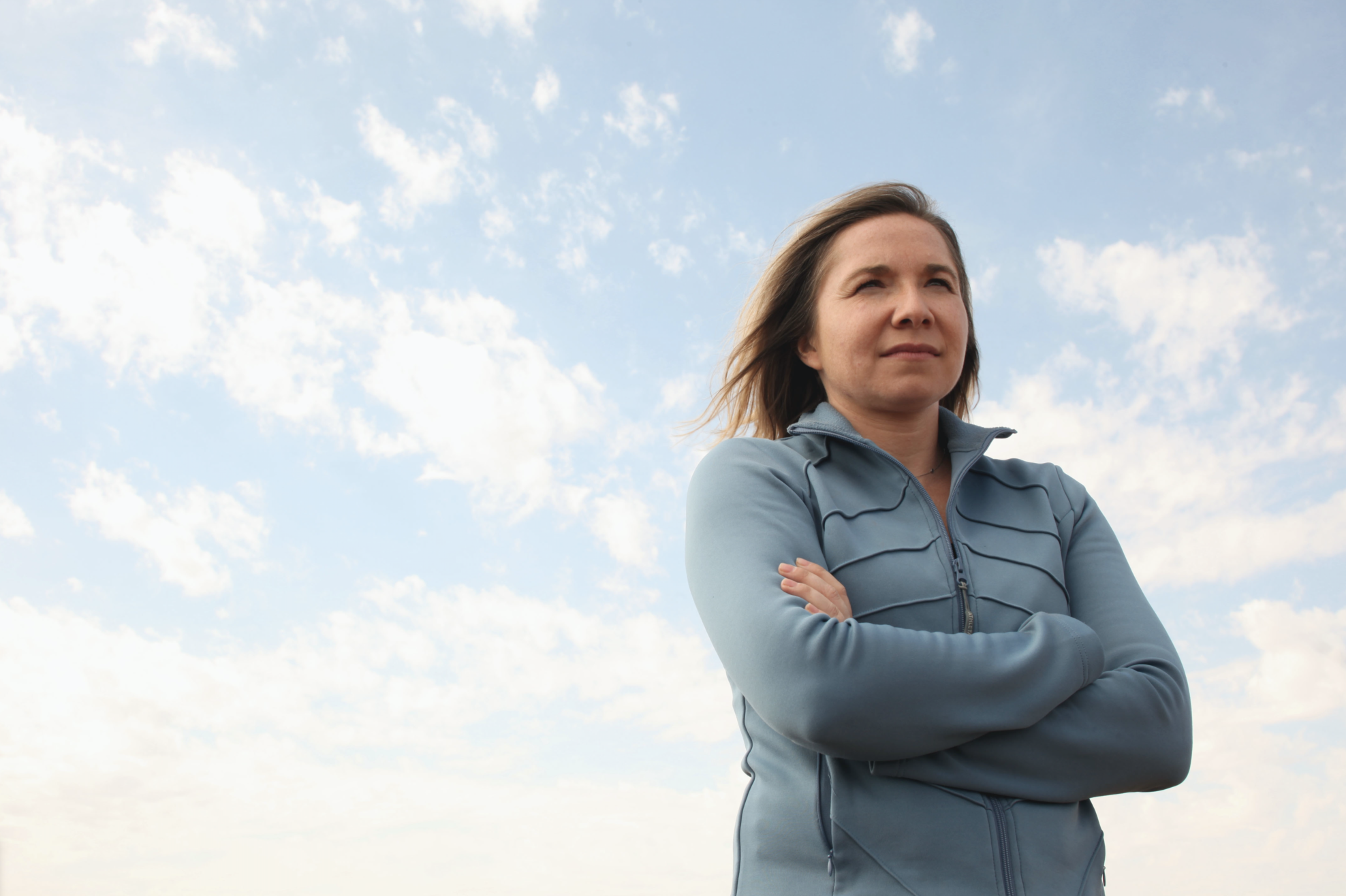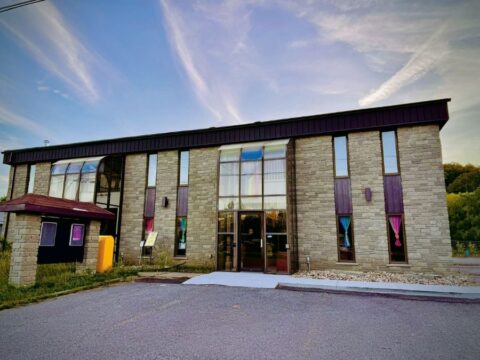This interview was originally published in the January 2015 issue of the United Church Observer and on our website with the title “Interview with Katharine Hayhoe.” Broadview is re-publishing it in light of the news that Hayhoe has received a 2019 Champions of the Earth award, the United Nations’ highest environmental honour.
Alex Newman: You’re an evangelical Christian and a climate scientist who knows that the climate is changing. Why do you think so many evangelicals doubt this?
You may unsubscribe from any of our newsletters at any time.
Katharine Hayhoe: It’s tied to politics — many American evangelicals believe you can’t be Christian unless you’re Republican, and therefore what Republicans say is what you believe.
Climate change is now one of the most politically polarized issues. A Lifeway survey from 2012 found that 54 percent of Protestant pastors in the U.S. do not think climate change is real. Where are they getting this information from? Not from science and not from the Bible; it’s coming from conservative news outlets. So when people we trust, whose values we share — our pastors, for example — tell us climate change isn’t a real problem, we believe them.
Another reason people are opposed to dealing with climate change is because the solutions are collective. For conservative Americans with their free-market libertarian perspective, imposing regulations is just wrong. So it’s easier to say there isn’t a real problem than to say there is a problem but we don’t want to do anything about it.
AN: Your husband, the author and pastor Andrew Farley, didn’t initially believe in climate change. How has that experience affected the way you communicate the science?
KH: When I met my husband, he did not think the climate was changing or that it was caused by human activity. He’s a smart person, though — he has a PhD in linguistics. It took us two years on this, going back and forth, before he was finally convinced.
This process was critical to my understanding of how best to communicate to a doubtful audience. It also made me realize that just because someone doesn’t agree with the science doesn’t mean they aren’t smart or that they don’t care about people or the planet. Nearly every single one of us already has all the values we need to care — we just don’t understand how our values connect to this issue. That’s a very different communication challenge than believing we have to instil new “green” values into people.
AN: So how do you communicate climate change to a doubting audience?
KH: I’m often asked, “Do you believe in global warming?” But it’s not a matter of belief — I know the climate is changing. The evidence is there, not just from global temperature records or ocean heat records, but from birds, bees, bugs, glaciers, sea levels. It’s important to start with the evidence.
There’s also the theology that people carry around: “Maybe this is God’s will and we’re in end times.” The thing is, and this is said many times in the Bible, nobody knows when that end time is coming. What’s more, as when Paul chastises the church in Thessalonica, Christians need to be reminded that they have a responsibility to care for others no matter what is ahead.
Finally, it’s important to remind ourselves that God gave us this world to take care of. Treating it like garbage isn’t consistent with that gift.
“For non-Christians to see Christians against climate change — essentially saying we don’t care about this issue, even though people will suffer — that is a terrible witness to the world.”
AN: When you speak to evangelical Christian groups, you bring out a global warming chart that shows only the last 6,000 years, considered by many evangelicals to be the biblical age of the Earth. Is it honest to leave out the previous 4.5 billion years?
KH: My education is in astrophysics, so I’m clearly on board with the scientific age of the universe. But while paleoclimate records are key to understanding our planet, they are not essential to understanding and communicating that climate is changing, that humans are responsible, and that we have to do something to avoid serious and even dangerous impacts on the natural environment and human society.
When we look at the last 6,000 years of Earth’s climate history, we get a powerful graphic that clearly demonstrates how unusual and abrupt the change in temperature has been since the beginning of the industrial era. And here’s the thing: to agree that climate is changing and that it’s due to human activity, we only have to agree that the world is more than 300 years old. I think we can all agree on that.
AN: Do doubters make you angry?
KH: At times I’ve been angry, but not with someone who doesn’t know what they’re saying. What makes me mad is people who deliberately distort the truth when they are familiar with the science.
It’s not the fault of people in the pew if they’re being lied to or getting distorted information. The church has been lazy and allowed outside sources to inform opinion. Partly that’s because the evangelical church doesn’t have strong hierarchical leadership or specific departments to handle this kind of thing, and so pastors go to sources they think they can trust. As a result, the leadership vacuum gets filled by conservative politics and media. What these outside sources are saying is disastrous — that climate change is incompatible with our values and is an issue that only liberals and atheists care about.
For non-Christians to see Christians against climate change — essentially saying we don’t care about this issue, even though people will suffer — that is a terrible witness to the world. It’s basically saying we don’t care about loving others. A key part of Christian witness is to be on the side of love, compassion and justice.
More on Broadview: How this Nobel winner balances physics and faith
AN: Is this idea of Christian witness maybe the key to the evangelical mind on this issue?
KH: Yes. When I was nine, my family moved to Colombia for several years when my parents worked as missionary educators. Some of my friends lived in homes made of cardboard Tide boxes, making them vulnerable to severe weather like floods and landslides.
People lacking food, water and homes is a message Christians respond to. Christians are always the first to open their wallets and homes to people in need. We just haven’t connected the dots yet with the issue of climate change.
AN: Are there any indications that evangelicals are changing?
KH: Yes, and I think two factors have influenced that. The first is so much physical evidence occurring close to home — heavy rainfall, drought, rising sea levels, stronger storms like Hurricane Sandy. It’s not like we never had floods before, but they’re happening more frequently, with more serious effects, and getting harder to fix.
Second, more voices we trust are speaking up — business leaders, admirals and generals, faith leaders like the Archbishop of Canterbury and Pope Francis. World Vision staff speak about how climate change affects people, especially the poor.
AN: Why is it so important to get the evangelical voice on this?
KH: A reporter recently asked me if there’s any hope of turning this climate disaster around without the evangelical voice. He twigged on something very important — that evangelicals are a powerful group and that if we did a 180 on this issue, it would have a profound impact on politics.
Historically, who led the charge with issues such as civil rights and slavery? Christians were right there at the front. We’re called to be salt and light to the world. Today, however, on the issue of climate change, evangelicals are more of an obstacle than a leader. It’s an embarrassment to the Christian faith that instead of loving our neighbours, we’re sticking our fingers in our ears.
This interview has been condensed and edited.














You lost credibility by making a blanket statement – not all Christians are Republicans. Not all Republicans are Christians. I would further speculate that the Democrats tend to be “anti-religious” in their views of society, hence the departure of Christians supporting that party. Both parties, like Canadian politics are very humanistic in their approach.
“For much of the twentieth century, the United Church was Canada’s de facto state church as it actively engaged in influencing political, social, economic, and foreign policy issues”. (Dr. James C. (Jim) Wallace)
It has been argued that L. B. Pearson won because of the influence of the United Church.
I don’t think Protestant pastors are in denial of climate change; rather it is the cause of climate change they deny. Not coming from the Bible? Here are a few Biblical suggestions… Genesis 8:21-22: God promises He will never again curse the ground. It is also implied that He will not flood the earth as well – unlike the disasters promised by ice caps melting. Matthew 6: 25ff: “Therefore I tell you, do not be anxious about your life….” Jesus reminds us that we are valuable in God’s sight. He’s in control, not fretting and He’ll take care of us. Mark 4:13-20 Parable of the Sower – vs 19 “But the worries of this life, the deceitfulness of wealth and the desires for other things come in and choke the word.” As Christians, we have better things to worry about rather than things that are in God’s control. If God is going to erase this world and rebuild it (2 Peter 3:7-12 Revelation 21-22), why are we trying to save it? I am not suggesting we “trash” it, but humanist thinking tells us we are capable of controlling what God has created and wills for us. On a side note we must remember that “global warming” and “climate change” like anything else, can be used to boost egos and make money.
There is an issue, and it could be real, but science and climatologists are not certain what the effects will be. So my question is: where do we start? The answer is not: “shut down the economy” and have zero emissions tomorrow.
Reliable data for temperatures are within the last 150 years (I use the word reliable, because there are no weather stations that have recorded weather consistently for the last 150 years. A rain storm may hit Calgary and a cloudless day in Red Deer will give different results if the weather station is located in Olds.) Looking at 150 years in comparison to 6000 years is looking at 0.02% of the data. Taking it from an evolutionary perspective ( say 4.5 billion years) it’s .00000000333333% and yet we can say this is reliable?
When you think of it, why should the Church be concerned with matters such as “global warming”? Our mandate is the reach a lost and dying world. To preach that God reconciled Himself to us through the death and resurrection of His Son, so that when we pass from this earth, we will be in His glory, with no concerns whatsoever. This, promised for eternity, is a lot better than the issues we think we have now.